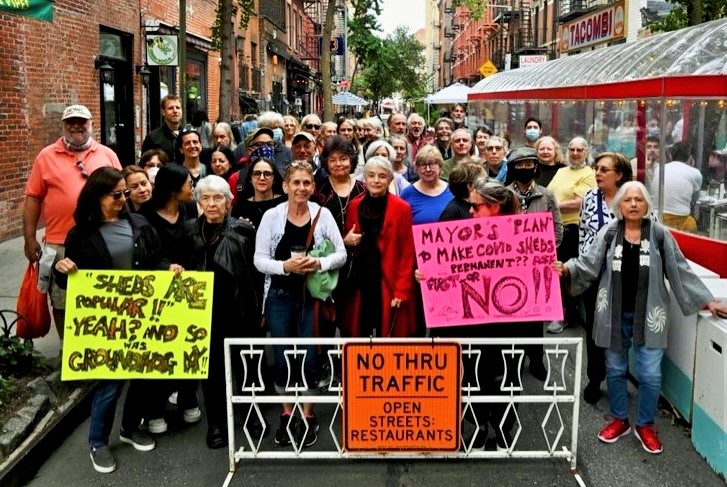BY LINCOLN ANDERSON | Now they’re the ones making some noise.
As city agency officials are starting to make the rounds of local community boards, presenting a text amendment to permanently lock into place the pandemic-inspired “roadway dining” program, Downtown residents who oppose the initiative are ratcheting up the volume of their protests to a new level.
A public review process is required for any changes to the city’s Zoning Resolution.
Under the text amendment, restrictions on where sidewalk cafes can be located in New York City would be lifted.
In addition, the administration of the sidewalk cafe program would be shifted from the Department of Consumer Affairs and Workforce Protection to the Department of Transportation.
Previously, an ad-hoc group called Save Our Streets, or S.O.S., coalesced for a few meetings, at which the idea of a lawsuit against the Open Restaurants program was broached by Village attorney Arthur Schwartz. The idea of suing, however, fizzled, due to lack of support among the members. Schwartz, who was then also running for City Council, said he then instead pivoted to file a different community lawsuit — against the New York City Housing Authority’s PACT (Permanent Affordability Commitment Together) plan, which would lease public-housing complexes to “development partners.”
At any rate, a new, more organized group is now on the scene — Coalition United for Equitable Urban Policy a.k.a. CUEUP. Its organizational team draws from South Village Neighbors, West Village Residents Association and Central Village Block Association. However, its 19 member groups hail from all corners of Downtown Manhattan, from the Bedford-Downing St. Block Association, E. Fifth St. Block Association and Soho Alliance to the Chinatown Core Block Association and the London Terrace Residents in Chelsea, plus as far away as Washington Heights/Inwood and Sunnyside Gardens in Queens
CUEUP’s expressly stated mission is to stop the Open Restaurants program from becoming permanent.
To that effect, the group has launched a petition on change.org, with its top goal being to quash the outdoor dining initiative.
In an e-mail in early May, CUEUP asked locals to join on to the effort “to put the brakes on the mayor’s headlong rush” to set Open Restaurants in stone. CUEUP calls Open Restaurants an “unjust top-down process” and no less than a “land grab” of public space.
“We supported the Open Restaurants program as a pandemic measure, and believe that with better enforcement, it should continue until restaurants can resume normal seating arrangements and regain their financial footing,” the e-mail said. “But as a permanent program, post-pandemic, we believe the program is a disaster. The outdoor restaurant and bar program means the street huts, the garbage and vermin, the impassable sidewalks and bike lanes, along with the loud crowds and drunken revelers and amplified busker music into the night will be permanent fixtures in our neighborhoods.
“Working hand in glove with the New York City Hospitality Alliance, a powerful lobbying entity, the city is ready to hand over our streets and sidewalks to one industry — at the expense of you and your neighbors,” the group said. “And so far they’ve gotten away with moving this forward with no public input.”
In short, CUEUP said, in another e-mail, “With restaurants expanding 100-400% seating, this means MORE trash, MORE waste, MORE pollution, MORE congestion, MORE emergency obstacles, LESS safe, LESS clean, LESS GREEN.”
In an interview with The Village Sun last month, Kathy Arntzen, the president of the Central Village Block Association and a longtime Cornelia St. resident, said the focus of CUEUP is simple.
“We’re trying to get through it so these [outdoor dining] structures don’t stay here forever,” she said. “Basically, CUEUP’s goal is to get our streets and sidewalks back and have some input in the future of our homes.”
Asked if she and her neighbors are wondering if things might be different with a new administration in City Hall come Jan. 1, she said, “We can only hope.”

At the same time, she said, CUEUP is not hostile to the restaurant industry. There are nine eateries on the one-block-long Cornelia St. alone, she noted.
“We on Cornelia St. are friends with many of the restaurants and we want them to survive,” she said.
But she stressed that the Open Restaurants program can’t be a one-size-fits-all since, for example, the Village has much narrower and tighter streets, with some intersections at acute angles, as opposed to, say, the Upper East Side.
“Here, it’s becoming impossible on weekends to just take a walk,” she said.
“Some garbage haulers have to back down the street because it’s impossible to turn on the the street from Bleecker to Cornelia,” she noted. She added that during the recent fire at Uncle Ted’s Chinese restaurant on Bleecker St., fire trucks had difficulty driving to and then accessing the building due to the outdoor dining sheds, causing the blaze to go to five alarms.
The Open Restaurants program, Arntzen said, “is really transforming the area. We know that music is not allowed, and now we have one outdoor structure that has two TVs and speakers. … You have people throwing up and urinating in the street.”
What is so galling to locals, the C.V.B.A. president said, is how the city has simply tossed out decades of negotiations and work by the community to create a livable environment.
“All those years at the community board, the rules for residents that made for quality of life, are basically being thrown aside,” she said.
As for whether CUEUP is mulling filing a lawsuit against the city’s push to make Open Restaurants permanent, she indicated it’s not imminent.
“I think right now [the plan is] just figure out what’s the best way to go about it,” she said.
Meanwhile, Marilyn Dorato, the head of the Greenwich Village Block Associations, said another issue with Open Restaurants is simply its aesthetics — the street structures’ hodgepodge appearance.
“It’s destroying neighborhoods, the look of it,” she said. “Greenwich Avenue is so tacky now. It looks terrible.”
Dorato, who lives near The Waverly Inn, noted that some residents, upset by the noise from the trendy Bank St. eatery’s outdoor dining area, took matters into their own hands earlier this year.
“People called 911 — false alarms,” she said. “Fire trucks would come by. This went on for two months. They thought it would bother the diners. … And The Waverly Inn isn’t even one of the worst,” she added.
And yet, Dorato said signs point to the restaurant industry rebounding strongly.
“The restaurant community was never going to die,” she said. “Restaurant people don’t move on to other professions.
“Manatus is in contract,” she noted of the former Bleecker St. Greek diner space. “Two Bank St. is going to have an Italian pizzeria, a Neapolitan company that wants an American presence — it’s huge. Otto [the former Mario Batali restaurant at One Fifth Ave.] will be Greenmarket-driven Italian.”
Regarding a lawsuit against making Open Restaurants permanent, Dorato said she fully supports the idea and thinks someone should file one.
As for The Waverly Inn, speaking in late May, one of its managers, Alex Cannariato, told The Village Sun that business was booming — up by around one-third over the usual amount — due to all the extra outdoor seating. But the depths of the pandemic had been brutal on business, he said.
As of now, there are areas with outdoor dining structures that were not allowed previously, such as Eighth St., whose sidewalks are legally not wide enough for sidewalk cafes. This is because sidewalk cafe rules have been suspended.
Although there is some confusion on whether there is a mandated closing time for the outdoor sheds and dining areas, they are not, in fact, allowed to be open until 4 a.m.
Maria Diaz, the executive director of the Greenwich Village – Chelsea Chamber of Commerce, said, “According to the permanent Open Restaurants’ webinar on July 1, the required closing is midnight from Sunday to Thursday and 1 a.m. on Friday and Saturday.”
The West Village Residents Association, a CUEUP coalition member, has been very active on the Open Restaurants issue in its own right.
Over the past winter, before CUEUP came on the scene, W.V.R.A. surveyed 380 restaurant locations in the 10014 zip code. They found that 214 were open, 90 were “hibernating” and 43 had gone out of business. Of the places open, 136 were “nonconforming” and 61 of these “egregiously so,” meaning their outdoor seating structures were 100 percent enclosed, in violation of COVID health regulations, according to the group.
Meanwhile, W.V.R.A. found many other flagrant violations, such as Svetta on Carmine St., for one, which had literally taken over the entire sidewalk, with a shed spanning from the restaurant to the curb. The association members dubbed places like this “COVID caves that you have to walk through.”
Although COVID regulations have since been lifted, all these past violations do not give the group confidence about the city’s ability to do the needed enforcement on outdoor dining moving forward.
Speaking back then, Leslie Clark, a leading member of W.V.R.A., said, “This program has gone rogue. This program has taken over public spaces.”
The group disparagingly refers to the outdoor seating areas as “barges.”
“Now we have hundreds of them,” Clark said of the sheds, “and we don’t know if they will ever be gone.
“It came down from on high. Now it’s permanent,” she said the program. “I like restaurants. … But is this the future?
“It’s not Paris — because Paris regulates it,” Clark said of the Big Apple’s Open Restaurants. “And they actually enforce the law — and they never, ever give away the roadway.
“I ask to be called a stakeholder, not a NIMBY,” she stressed. “I pay taxes here, I vote here, I’ve been here for 45 years.”
In addition, W.V.R.A. found that the 10014 zip code — Greenwich Village west of Sixth and Greenwich Aves. — has the state’s third-highest number of premises with liquor licenses, despite the fact that much of the area is a historic district with narrow streets. (The state’s top two most alcohol-saturated zip codes are 10003, which includes part of the East Village and Union Square, and 10019, which includes Midtown, according to the group’s research.)
Meanwhile, the West Village’s 10014 zip code has seen an explosion of liquor licenses from 188 in 2000 to around 400 now. All of this means the Village is being impacted more heavily by the Open Restaurants program than almost anywhere else in the entire state.
“We’re struggling to keep our finger in the dyke,” said Augustine Hoppe, another association member. “We don’t believe we should be an alcohol district, a late-night drug district, like the Lower East Side has already become.”
Kate Quinn, another W.V.R.A.’er, said she was being driven to distraction by people now regularly hanging out and smoking under her window due to Open Restaurants.
“We love our restaurants,” she said. “I’m a terrible cook. But if this is what our neighborhood has become… . This program is doing what Robert Moses and Osama bin Laden failed to do — destroy my neighborhood.”


Be First to Comment